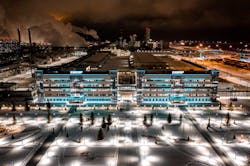SIBUR lets contract for carbon-reduction study for Tyumen chemical complex
PJSC SIBUR Holding has let a contract to NOVA ENERGIES—a joint venture of Technip Energies and JSC NIPIgaspererabotka (NIPIGAS)—to provide preliminary front-end engineering and design (pre-FEED) for implementation of proposed carbon capture and reuse solutions to reduce emissions at SIBUR subsidiary LLC ZapSibNeftekhim’s more than 2-million tonnes/year (tpy) petrochemical complex—Russia’s largest— in Western Siberia’s Tyumen region, about 10 km east of Tobolsk, Russia (OGJ Online, Aug. 4, 2021).
As part of the pre-FEED study contract, NOVA ENERGIES will use best available technological and technical solutions to develop the technology as well as a cost estimate for the process of capturing, transporting, and reusing carbon dioxide (CO2) generated by operations at ZapSibNeftekhim’s complex and the nearby Tobolsk thermoelectric power station, which is the sole supplier of steam to the complex and the key supplier of heat for residential and commercial sites in the region, Technip Energies and NIPIGAS said on Oct. 12.
The service providers disclosed neither a duration nor value of the contract.
ZapSibNeftekhim’s proposed carbon-reduction project at Tyumen follows SIBUR’s environmental, social, and governance (ESG) sustainability strategy to 2025, under which the operator announced its intention to increase its investment in research and development projects aimed at reducing greenhouse gas emissions (GHG), including development of carbon capture and storage (CCS) technology to help further reduce GHGs from its operations.
The planned carbon-reduction measures would come in addition to the operator’s existing mitigation measures, which currently include recycling of CO2 emissions from burning of oil by-products such as associated petroleum gas (APG), according to SIBUR’s October 2021 presentation to investors.
In addition to its 1.14-million tpy polypropylene production, ZapSibNeftekhim’s Tobolsk petrochemical complex produces 1.77 million tpy of polyethylene, 829,000 tpy, as well as a mix of byproducts including butadiene, butene-1, methyl tertiary butyl ether, and pyrobenzene, SIBUR said in its 2020 annual report.
About the Author
Robert Brelsford
Downstream Editor
Robert Brelsford joined Oil & Gas Journal in October 2013 as downstream technology editor after 8 years as a crude oil price and news reporter on spot crude transactions at the US Gulf Coast, West Coast, Canadian, and Latin American markets. He holds a BA (2000) in English from Rice University and an MS (2003) in education and social policy from Northwestern University.

